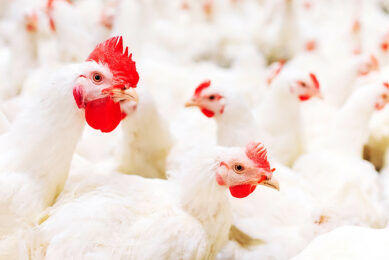AGP reduction with alpha-monoglycerides

Recent trials in rabbits and broilers show that glycerides of fatty acids were able to maintain productivity in animals fed antibiotic free diets. Due do their unique molecular structure, alpha-monoglycerides possess specific characteristics. These characteristics make them highly effective in improving the health status of farm animals.
The use of antibiotics as growth promoters has been banned in the European Union since 2006. This withdrawal was the result of concerns about the development of antimicrobial resistance and the transfer of antibiotic resistant genes from livestock to humans. The therapeutic use of antibiotics is also being restricted in most countries worldwide. Due to the increasing demand for animal feeds without antibiotics, the feed additive market is witnessing strong growth. The variety of available additives, such as essential oils, pre- and probiotics and all kinds of phytogenic products, is large. The feed additive that is still standing strong after all these years is the group of organic acids. Organic acids, especially when used in blends, are well-known for their strong antibacterial effects. They are able to disturb the bacterial cell wall and, at a low pH, to enter the pathogenic cell. As a consequence, vital cell processes, like protein and energy production and the formation of DNA, are disturbed, causing the pathogenic cell to die.
However, research shows that it is possible to achieve a higher efficiency and better health with organic acids if alpha-monoglycerides are used. In this case an organic acid, like a short chain fatty acid (SCFA) or medium chain fatty acid (MCFA), is specifically linked to the first position of a glycerol molecule via an ester bond. The success of alpha-monoglycerides lies in this unique molecular structure. The molecules are pH independent and less susceptible to enzymatic breakdown, which makes them active in the entire gastrointestinal tract. Research shows that alpha-monoglycerides have a much stronger antimicrobial effect compared to conventional organic acids.
Antiviral and anti-inflammatory effects
Today, the antibacterial effects of alpha-monoglycerides are well-documented. In addition, it becomes more and more clear that they also possess antiviral properties against fat-enveloped viruses. Alpha-monoglycerides are found to cause leakage by affecting the viral envelope. Higher concentrations might lead to the complete breakdown of the viral particles. Ellen Damen of Framelco R&D: “We see that products based on glycerides of lauric acid (C12) are gaining popularity in fighting viral diseases like Newcastle Disease (ND) and Infectious Bronchitis (IB). These in vivo effects may not solely be attributed to the direct antiviral effect of alpha-monoglycerides, but also to their immunomodulatory properties.” Studies have shown that antibody titres against IB are increased in broilers fed glycerides of lauric acid. Furthermore, numerous studies have shown that monoglycerides can influence the level of cytokine production in different animal species.
It has been suggested that immunomodulatory compounds, like glycerides of fatty acids, may be more effective when absorbed via the lymphatic system. That is because the lymphatic system is the bodies’ principle transport pathway for B- and T-lymphocytes, the most important immune cells. That lauric acid was preferentially transported via this lymphatic system was first demonstrated in rats by Sigalet and Martin (1999). Framelco has strong indications that the same applies to pigs, as alpha-monolaurin was found in blood samples of pigs fed alpha-monolaurin. It is believed that alpha-monoglycerides also have a positive effect on inflammatory responses and elimination of infections in animals. This could help reducing the negative impact of inflammatory processes on growth performance. The anti-inflammatory properties of alpha-monolaurin and a combination of alpha-monocaprylin (C8) and alpha-monocaprin (C10) were tested in vitro at the KU Leuven University, Belgium. Both products showed a clear reduction of the nitric oxide (NO) production of marophage-like cells, indicating an anti-inflammatory effect. To prove the described effects, several trials were conducted in collaboration with universities.
Replacing antibiotics in broilers and rabbits
Results from Hungary show that FRA Gut Balance Dry, a product based on glycerides of SCFA and MCFA, was able to replace valnemulin in weaned rabbits. Valnemulin is commonly applied in commercial rabbit farms to reduce mortality due to epizootic rabbit enteropathy (ERE). ERE is associated with an imbalance in the microflora, which allows overgrowth of clostridia. Toxins produced by these clostridia paralyse the intestines. The results show that FRA Gut Balance Dry was able to maintain growth performance whilst strongly reducing mortality, see Table 1. Damen: “This is certainly a promising study. Further trials are now being conducted to validate these effects.”
A study at the University of Agriculture Faisalabad in Pakistan showed that Lincomycin indeed has a positive effect on growth performance of broilers. Removing this antibiotic growth promoter resulted in inferior results. Adding glycerides of lauric acid (FRA C12 Liquid) to the drinking water improved weight gain compared to the negative control. The FCR was even more improved with FRA C12 Liquid than with Lincomycin, see Table 2. Damen reacted positively on these results: “Glycerides of fatty acids could be a tool to reduce antibiotics in broiler diets.”
In a world without antibiotic growth promoters and restricted use of antibiotics, products based on alpha-monoglycerides are gaining popularity to promote animal health and to optimise animal performance. This is due to their unique molecular structure, which allows them to be highly antibacterial and antiviral in the entire gastrointestinal tract. In addition, they show a positive effect on the animal’s immune response, thereby reducing the risks of secondary infections and decreasing the negative impact of infections on growth performance.
References available on request







